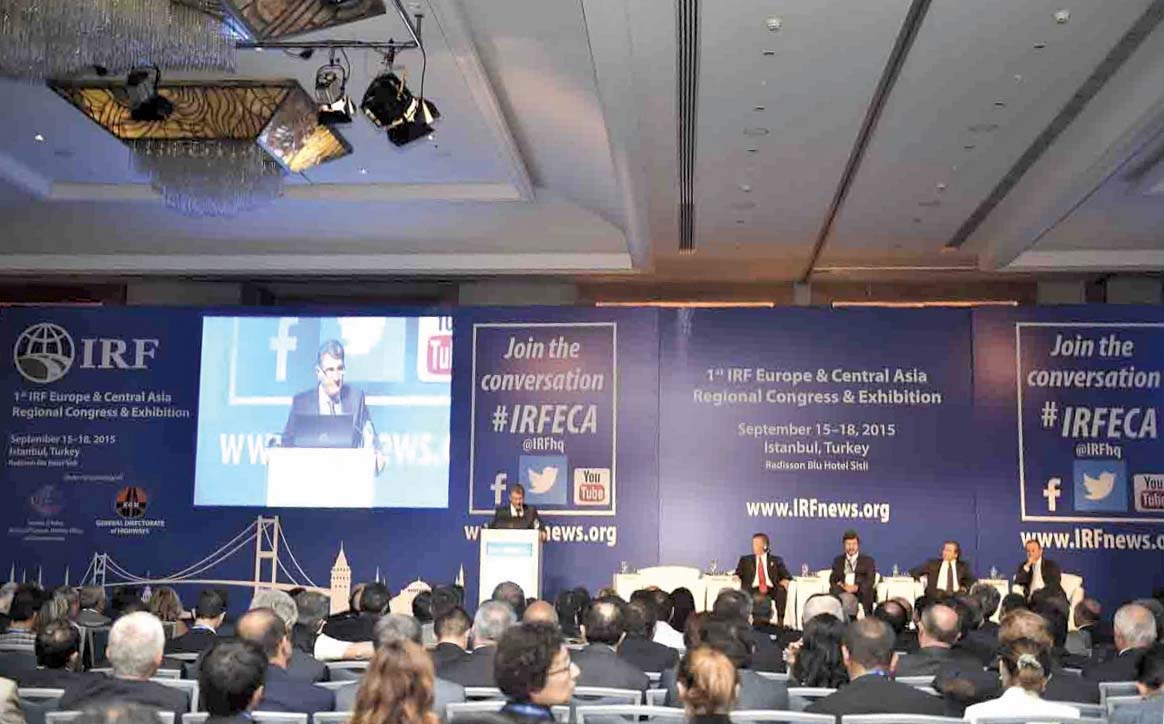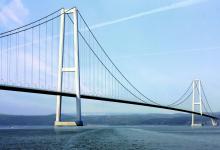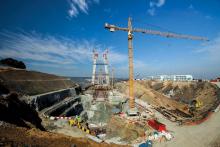
The
The European & Central Asia region is a geographic area covering 23 countries located in Central, Eastern and South Eastern Europe, the Russian Commonwealth (CIS) and Turkey. The common factor between these countries is a shared history of relatively recent transition from planned to market economies, and the profound impact this has had on trading patterns, transport services and infrastructure needs.
The reason why this congress was held on in Turkey was explained with the comment that, “By growing cross-border trade and renewed interest for coordinated investment mechanisms aimed at fully capturing the socio-economic benefits of the road transport, the region is now at a turning point. To be able to achieve their potential, these trade corridors need to be structured around a set of shared priorities between governments, the private sector and development agencies.“
At that point, Patrick Sankey, IRF president and CEO said, “The initial objectives for the 1st IRF Europe & Central Asia Regional Congress is to transfer the latest technologies and knowledge from those who have it to those who need it, and, in doing so, promote an agenda of shared prosperity that flows from accessible, affordable and sustainable road networks. With this congress, the goal was to foster a common culture of excellence in highway planning and operations and help policy-makers, planners and infrastructure operators from across Europe and Central Asia translate shared challenges into concrete policy and planning decisions.
Turkey offered an ideal setting for these discussions to take place, not only on account of its privileged geographic position at the crossroads of Europe, Central Asia and the Middle-East, but also on account of the country’s unprecedented effort to develop and modernise its transport infrastructure by 2023. Some of Turkey’s anchor investment projects, such as the Yavuz Sultan Selim Bridge are already setting new standards in our industry. As the president of the G20, Turkey also has a key role in emphasising the critical value of coordinated infrastructure investment and trade facilitation programmes.
Sankey continued, “One of the notable challenges which the region needs to work together on is placing user safety at the heart of transportation decisions. An important milestone takes place this year with the mid-term review in Brazil marking the halfway point towards the 2010 objective of saving 5 million lives that would otherwise be lost on our roads. At a time of growing motorisation throughout the region, the devastating social and economic impacts of this epidemic can no longer be ignored.”
“Those countries that have been most successful in improving their road safety record have done so by taking action across a range of areas, including adopting better road engineering, data systems, strengthening enforcement capacity, and adopting more comprehensive traffic safety laws. We are fortunate to be joined by representatives of the World Bank, of the UNECE, of the European Commission, and of the International Road Transport Union and world-class enforcement professionals who all share our passion for road safety. “
From the hosting country, Turkey, smail Kartal, director general of directorate general of Highways – Ministry of Transport, Maritime Affairs and Communications, mentioned about the government planning for the current and upcoming road, bridge and tunnel projects. He gave information about the targets of the government until 2023 about those new projects, which will be realised by using not only public budget, but also by utilising the public–private partnership (PPP) systems, to be able to connect the east to west–north to south corridors.
He said, “Turkey has embarked on an unprecedented effort to develop and modernise its transport infrastructure by 2023, marking the centennial of the foundation of the modern Turkish republic. This plan, which seeks to propel Turkey as the world’s 10th largest economy, sets an ambitious highway construction agenda with 36,500km of dual carriageway roads and another 8,000km of motorways serving the needs of an estimated 378 billion passengers/km and 365 billion tonnes/km. In parallel, a nationwide integrated traffic management and traveller information system relying on 17 regional centres and 7,500km of fiber optic cable is scheduled for completion by 2023.
“Early results are encouraging and new standards have already been set on some of Turkey’s anchor investment projects, such as the Mount Ovit Tunnel. With a length of 14.7km, it is set to be the longest double tube road tunnel in Europe. The 433km stanbul-zmir highway includes the 2682m long zmit Bay Suspension Bridge - one the largest build–operate–transfer (BOT) projects in the world and the BOT financed 95km Odayeri-Paaköy section of the North Marmara Motorway, which includes a 2168m long cable stayed suspension bridge over the Bosphorus strait in Istanbul.”
During the event, there were several different sessions and workshops. There were Plenary Sessions, Host Sessions, Executive Sessions, Partner Sessions, Safer Roads by Design, Technical Session, Applied, Knowledge and Certificated Workshops and Poster Sessions.
During those sessions, the high level, keynote speakers made their speeches, together with the other speakers, coming from different countries. From 120 received papers, the 90 were presented in the sessions that are called Bridging the Infrastructure Gap: Engaging the Private Sector; Transport Corridors in South East Europe; Safer Roads by Design; Walls Across the Modern Silk Road; Best Practices in Highway Operations & Management; Preserving & Enhancing Road Assets, Major Infrastructure Programs in Turkey; Speed & Driver Behaviour Management; Innovations in Road Safety Applications; Towards Zero Road Death & Injury in ECA; Major Infrastructure Programmes in GCC & Emergent Countries; Managing Complex Project Delivery; Overview of European and Turkish Asphalt Industries; Work Zone Safety, Innovations in Transport Sustainability; Cooperative ITS Programmes, Innovations in Tunnel Construction; Vulnerable Road Users; Towards Sustainable Roads; Targeting Road Risk with iRAP; Inspection & Testing Applications.
During the event, two side visits were arranged: the first one was to the construction side of the 3rd Bosporus Bridge. The 3rd Bosporus Bridge (Yavuz Sultan Selim Bridge) forms the centrepiece of the Northern Marmara Motorway project aimed at improving transport connections between Europe and Asia and cutting chronic congestion in Istanbul. Once completed, the bridge will be the world’s longest combined motorway/railway bridge with four motorway lanes and one railway line in each direction for a budgeted cost of approximately US$2.5 billion.
The second visit was arranged to Istanbul Traffic Control Centre: despite a wide offering of transport services,
Besides, some awards were given during the congress. On 15 September, during the opening ceremonies the 2015 IRF Professional Award, given to Umberto de Pretto, and the IRF Lifetime Achievement Award, given to Fredric S Berger, on the memory of Fredric S Berger (1947-2015), were presented by Sankey.
The other awards, related with IRF Global Road Achievement Awards Programme, were presented during the Gala Dinner on 17 September. The IRF GRAA programme is aiming to demonstrate excellence and innovation in road development worldwide and to elicit information on successful projects and programmes from leading industry organisations to draw attention to the leading projects and organisations, providing a road map for others to follow in continuously improving and advancing road development worldwide. Related to this programme, the awards were given to the different parts, that are the companies, academicians, the public and the private sectors and the associations on the different categories called “Safety; Design; Research; Quality Management; Program Management; Environmental Mitigation; Urban Planning & Mobility; Asset Preservation & Maintenance Management; Construction Methodology; Project Finance And Economics; Technology; Equipment & Manufacturing; Traffic Management and Intelligent Transportation Systems”.
IRF, whose aim is to play a major role in all aspects of road policy and development worldwide for governments and financial institutions, for the private sector and for the community of road professionals said, “Our vision is as a global broker of knowledge is embodied in our cycle of regional congresses, which act as a valuable meeting point where regional and international transportation experts discuss and offer solutions to growing infrastructure and mobility challenges. With this congress, our goal was to foster a common culture of excellence in highway planning and operations and help policy-makers, planners and infrastructure operators from across Europe & Central Asia to translate shared challenges into concrete policy and planning decisions and to promote an agenda of shared prosperity that flows from accessible, affordable and sustainable road networks.”







